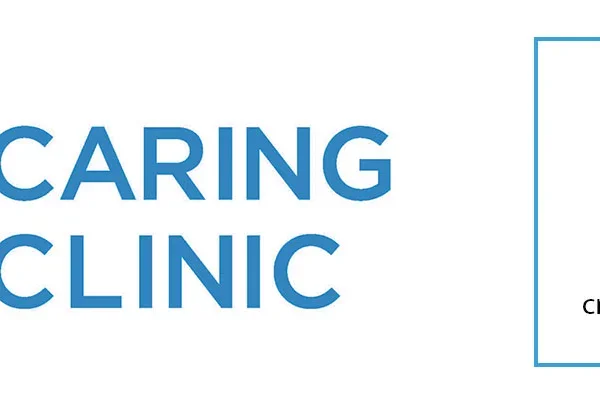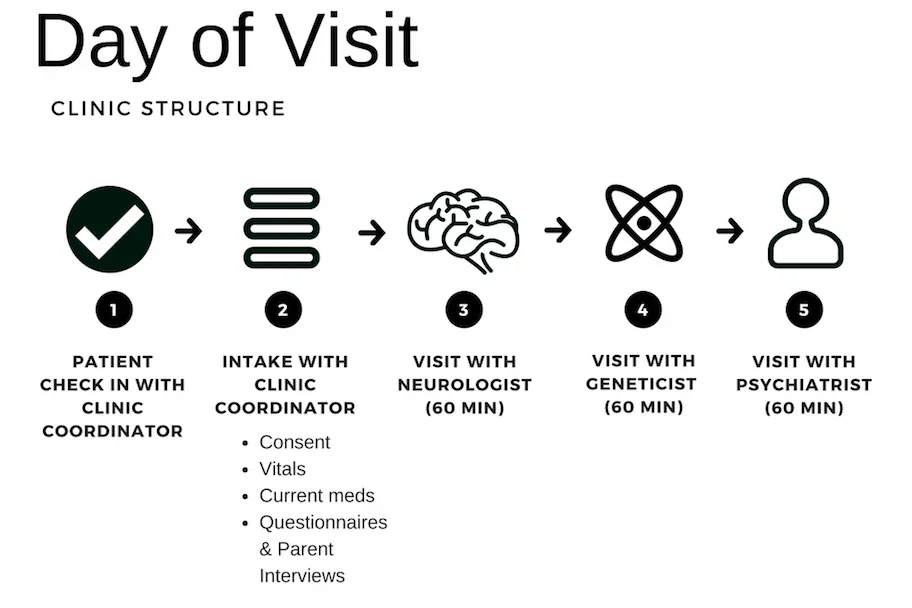Neurodevelopmental

The Care and Research in Neurogenetics Clinic or the CARING Clinic (formerly the Developmental Neurogenetics or DNG) is a multidisciplinary clinic that evaluates and treats children and adults with neurodevelopmental disorders and know genetic syndrome or variant.
With rapid advances in genetic testing and its routine use in the medical evaluation of a child with a neurodevelopmental disorder (including autism spectrum disorder, intellectual disability, and attention deficit hyperactivity disorder), at least 30% of children with a neurodevelopmental disorder now hold a genetic diagnosis. Unfortunately, the diagnostic precision of genetic testing has outpaced clinical management. There exists considerable disparity in the care of these complex children in the community, with uncertainty regarding the prognosis, medical monitoring, and treatments that may be effective for children with these rare disorders.
The CARING Clinic was established to address this disparity and provide precision medicine services for children with neurodevelopmental disorders. The clinic also recognizes that some of the disparity in care is due to a lack of providers in the community with the experience and expertise to take care of these children with multisystemic problems. In order to address this problem, the clinic is also a training clinic in which pediatric neurology, genetics, and child psychiatry fellow physicians observe and participate in the care. The CARING clinic provides a multidisciplinary care setting that combines excellence in clinical diagnosis and management for these children with neurodevelopmental disorders and associated genetic syndromes.
At first consultation, the patient receives a comprehensive and multi-disciplinary evaluation from a team of neurologists, child psychiatrists and geneticists. Further specialty consultation and behavioral assessments can be provided as needed. This clinic also provides opportunities for participating in longitudinal studies that lay a foundation for future clinical trials for rare disorders. Additionally, the clinic ties eligible children into a variety of research studies and treatment opportunities through UCLA CART (Center for Autism Research and Treatment) and IDDRC (Intellectual Development and Disabilities Research Center).
Brain and Behavior in Genetic Syndromes (B-BIGS)
What is being studied?
Children with 15q11-q13 duplications are at high risk for neurodevelopmental disabilities, particularly autism spectrum disorder (ASD) and intellectual disability (ID). The purpose of this study is to systematically characterize cognitive and social-communication abilities in children with dup15q syndrome, using standardized behavioral testing, play-based assessments, and EEG. The overarching goal is to determine if there are specific areas of strength or impairment that may serve as targets for behavioral intervention.
Who can participate?
- Children between 1 and 18 years of age with either dup15q syndrome
- Children between 1 and 18 years with an intellectual disability or global developmental delay
What does the study involve?
The study will involve approximately 4 hours of testing, including parent questionnaires, behavioral evaluations of the child, and a 45-minute high-density EEG session. We will provide each family with written and verbal feedback on the behavioral testing.
Whom should I contact to get involved?
If you are interested in participating in this study, please contact Carly Hyde at (310) 825-8738 or by email at chyde@mednet.ucla.edu.
CARING Clinic – Eligibility
Eligibility criteria required for evaluation in the CARING clinic include:
- A neurodevelopmental or psychiatric diagnosis: intellectual disability, developmental delay, autism spectrum disorder psychiatric comorbidities such as anxiety, attention deficit, depression, and schizophrenia/psychosis
- An associated genetic variant (copy number variation or single gene disorder) or syndrome confirmed through genetic testing

*Due to the comprehensive nature of the clinic set-up, families should anticipate spending 3-4 hours in clinic.
How to schedule an appointment:
To schedule an appointment, please contact the CARING Clinic Coordinator, Careese Stephens, at cmstephens@mednet.ucla.edu or (310) 206-7404.
How to prepare for the visit/what to bring:
- Prior to the visit, all patient’s medical records must be mailed or faxed to the clinic if not already in the UCLA database. It is especially imperative that any past MRI (or other brain imaging), EEG, or genetic reports be received by the clinic before visit. If your child has received an MRI, please bring a disc of the images to be uploaded to the UCLA system.
- Mailing Address: UCLA CARING Clinic, 300 Medical Plaza, Suite 1253, Los Angeles, CA 90095
- Fax Number: (310) 825-5197
- Please bring list of current medications and doses to the appointment and also a list of previous medications your child has taken.